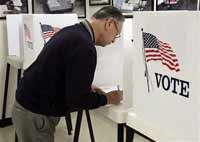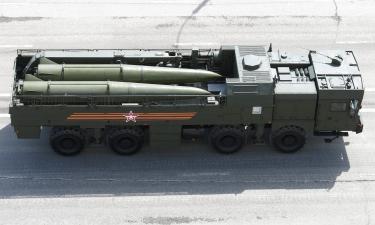U.S. elections reach their boiling point on Super Tuesday
On February 5, Tuesday, the USA is holding primaries in 24 states. In connection with the record number of states participating in the voting, the day of February 5 has been dubbed as Super Tuesday in the presidential race in the United States.

The coast-to-coast voting will finally determine the leaders of the two feuding parties who will fight for the presidential position at the closing stage of the pre-election campaign.
Democrats – Senator Barack Obama and former first lady Hillary Rodham Clinton - raise the biggest interest in the USA.
The first results on the major voting on Super Tuesday will become known later today. The results of Super Tuesday will be summed up tomorrow night, when primaries will end on the USA’s Eastern Coast.
Barack Obama and Hillary Rodham Clinton fought for front-runner status in a tightening Democratic contest, while Republican John McCain hoped to bury rival Mitt Romney's presidential hopes in voting from Alaska to the Atlantic on Super Tuesday, the biggest primary day in U.S. history.
The vote is almost a national primary: each party was holding contests in more than 20 states, including some of the most populous, such as California and New York. At stake are about half the delegates who will choose a nominee at party conventions in August and September, the AP reports.
Clinton, the New York senator and wife of former President Bill Clinton, was long seen as the inevitable Democratic candidate with double-digit leads in the polls just weeks ago. Her supporters had expected that she would lock up the nomination with big wins on Super Tuesday.
But Obama, a first-term Illinois senator campaigning on a theme of hope and change, has narrowed her lead to little or nothing in the latest national and individual state polls.
Neither candidate was expected to emerge from Super Tuesday as the presumptive nominee. Clinton and Obama each hoped to win the majority of delegates at stake and claim front-runner status heading into the next rounds of state primaries and caucuses.
With so many states casting votes, Democrats were spending unprecedented amounts of money on television advertising. Clinton and Obama each poured more than $1 million (EUR 670,000) a day into TV ads in the last week alone.
Clinton turned talk-show host Monday night, buying an hour of time on the cable television Hallmark Channel to televise a town hall meeting from New York in the Super Tuesday states. With husband Bill and daughter Chelsea on camera in other locations, she took questions from voters beamed in from far-flung locales.
Obama campaigned with Massachusetts Sen. Edward M. Kennedy and his niece, Caroline Kennedy, in New Jersey at the IZOD Center, next to the home of the Giants, who posted one of the biggest upsets in Super Bowl history, defeating the previously unbeaten Patriots on Sunday night.
"Sometimes the underdog pulls it out," Obama said. "You can't always believe the pundits and prognosticators."
The electoral territory was vast and so were the stakes. Romney, his Republican bid on the line, logged more than 5,000 miles (8,000 kilometers) in a 37-hour coast-to-coast dash as tried to block McCain from wrapping up the nomination. McCain led by double digits in national polls, but some surveys showed Romney gaining ground in delegate-rich California.
"I think you're going to see a growing crescendo of Republican conservatives getting behind my candidacy," the former Massachusetts governor said. But he conceded: "Right now that hasn't entirely happened."
McCain struggled to close the sale with his party's conservative base after coming strikingly far without its solid support in a remarkable comeback for a candidate whose hopes appeared dashed just months ago.
"I will preserve my proud conservative Republican credentials" while extending a practiced hand to Democrats, McCain promised.
Romney sought until the end to exploit the right's mistrust of McCain, a veteran Arizona senator who opposed President George W. Bush's tax cuts when they were introduced, advocated a path to citizenship for illegal immigrants, favors mandates to slow global warming and led campaign finance reforms that activists say trampled on their speech rights.
McCain struck back Monday with a television ad that showed Romney in a 1994 Senate campaign debate against Sen. Edward M. Kennedy, saying he was "an independent during the time of Reagan-Bush. I'm not trying to return to Reagan-Bush."
Romney campaigned from Tennessee to California on the eve of the voting, only to turn back to attend West Virginia's Republican state convention Tuesday. McCain, Obama and Clinton held rallies in the Northeast.
Former Arkansas Gov. Mike Huckabee, an ordained Baptist minister, focused on the South, where he enjoys support from Christian conservatives.
McCain could finish first in several Southern and border states - Alabama, Georgia, Oklahoma and Missouri - with Huckabee and Romney splitting the conservative vote.
Former New York Mayor Rudy Giuliani's decision to quit the race and endorse McCain after Florida's primary has given the Arizona senator a boost in Northeastern states where there are many moderate Republicans.
AP photo
Subscribe to Pravda.Ru Telegram channel, Facebook, RSS!


